The risks of turning symbols into battlegrounds
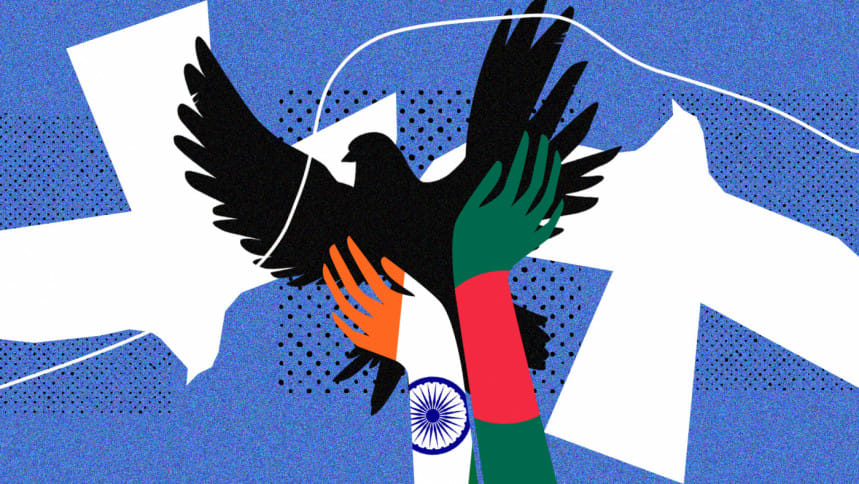
Flags hold a special place in the hearts of nations. They are not just pieces of cloth fluttering in the wind—they carry the weight of collective memory, identity, and pride. When someone burns or desecrates a flag, it's more than an act of protest; it's a statement that can cut deep and spark anger, sometimes even chaos.
Recent incidents involving the desecration of national flags in both India and Bangladesh have turned into flashpoints, threatening to unravel delicate ties between the two neighbours. These actions, whether deliberate or impulsive, are a reminder of how fragile relationships can be when symbols of identity are treated carelessly. Let's talk about why these symbols matter so much, how such actions deepen divides, and what lessons history can teach us about handling these situations better.
Tensions have been running high between Bangladesh and India after a few troubling events. In Kolkata, protesters outside the Deputy High Commission of Bangladesh set fire to the Bangladeshi flag along with an effigy of the chief adviser. In Agartala, protesters attacked the Assistant High Commission of Bangladesh. Meanwhile in Bangladesh, reports emerged of students walking over images of the Indian tricolour painted on the ground in some prestigious educational institutions.
These acts have triggered outrage on both sides. Bangladesh's foreign ministry issued statements expressing serious concerns and resentment about the attacks on its diplomatic missions, noting that such protests breached security arrangements and made their staff feel unsafe. In India, some hospitals and medical associations reacted by declaring that they would stop treating Bangladeshi patients, a move that could have serious human consequences for people who seek medical help across borders. Meanwhile, the hotel and restaurant owners' association in Tripura announced they were temporarily banning Bangladeshi tourists.
These retaliatory moves show how quickly emotions can escalate and turn minor incidents into major controversies, deepening mistrust and threatening the goodwill between neighbouring countries that share a long history and complex ties.
The history and power of flags
Flags, as a concept, are relatively new in the grand sweep of history. They became widely recognised symbols of nationhood in the 18th and 19th centuries. As political theorist Benedict Anderson explains in Imagined Communities, nations are constructed through shared symbols and stories. A flag is one such symbol that embodies the collective imagination of a country's people.
But that same power also makes flags easy targets. Throughout history, flag desecration has been a provocative form of protest. During the Vietnam War, the United States saw widespread flag-burning as an act of defiance against its government. In South Africa, during apartheid, anti-government activists burnt the national flag to reject the regime's legitimacy.
The emotions tied to flags vary by country. In the US, the First Amendment protects flag desecration as a form of free speech. But in countries like Bangladesh and India, where the national identity is closely tied to hard-won independence struggles, such acts are seen as deeply offensive and often lead to severe backlash. The recent incidents show how such provocations can lead to a ripple effect. On the surface, these acts may appear as isolated incidents, but they tap into deeper insecurities and grievances. The emotional reactions they provoke often blur the lines between rational discourse and blind outrage.
The role of sensationalist media in fanning the flames is impossible to ignore. For example, in Bangladesh, the arrest of a former ISKCON member was widely misrepresented by sections of the Indian media as an attack on Hindu minorities, despite evidence showing that it was unrelated. The tragic murder of a lawyer in Chattogram during clashes between the former ISKCON member's followers and police was also sensationalised to create religious tensions.
These skewed narratives don't just inflame tempers, they shift public focus from genuine issues to symbolic conflicts, making peaceful resolutions even harder to achieve.
The role of the law
The Flag Act, 1972 in Bangladesh and its 2010 amendment impose penalties for flag desecration, including up to two years of imprisonment and a fine. India also has stringent guidelines under its Flag Code, dictating how the flag must be treated and prescribing punishment for violations.
In countries like Denmark, burning a foreign flag is illegal, while burning the national flag is allowed under free speech rights. In Saudi Arabia, desecrating the flag, which features Islamic scripture, is considered both a religious and national offence.
Laws like these reflect a nation's values, but they can only go so far in preventing symbolic provocations. Addressing the root causes of such acts—be it political dissatisfaction, social unrest or inter-group tensions—requires broader efforts beyond legislation.
When emotions boil over symbols like flags, they risk diverting attention from more pressing issues. For Bangladesh and India, this includes vital concerns like Sheikh Hasina, water-sharing agreements, trade partnerships, and border management.
In George Orwell's 1984, the manipulation of symbols is central to maintaining control over society. Likewise, in William Golding's Lord of the Flies, a group of boys descends into chaos partly because of their obsession with symbols of power and fear.
These examples emphasise the importance of handling symbols carefully. Symbols can unite, but when misused or misunderstood, they can also tear societies apart.
What's the way forward?
Both the governments and civil societies must take responsibility for defusing tensions. This means avoiding knee-jerk reactions to incidents and focusing on long-term solutions. Leaders on both sides should address the root causes of such acts, be it misinformation, cultural misunderstandings or political grievances.
One way to promote greater understanding is through education. Teaching young people about the shared histories and struggles of Bangladesh and India can build empathy and mutual respect. Cultural exchanges, joint initiatives, and public dialogues can also help bridge gaps and counteract divisive narratives.
At the same time, media organisations must commit to responsible reporting. Sensationalism may grab attention, but it does so at the cost of trust and truth. As Amartya Sen argues in The Argumentative Indian, societies flourish when debates are grounded in reason and respect, not hysteria.
For Bangladesh and India, the stakes are too high to let flag-related controversies derail progress. Both countries face shared challenges, from climate change to economic development, and cooperation is essential for overcoming these hurdles. With careful handling, even the most provocative acts can become opportunities for dialogue and growth.
Ultimately, flags are not just pieces of cloth. They are carriers of collective hope and history. Respecting them means respecting the people and principles they represent. By focusing on what unites rather than what divides, Bangladesh and India can show the world that symbols don't have to become weapons to wield against each other. In a world increasingly fractured by identity politics, we have to look beyond the fabric and focus on the fabric of humanity itself.
H.M. Nazmul Alam is lecturer at the Department of English and Modern Languages of the International University of Business, Agriculture and Technology (IUBAT). He can be reached at [email protected].
Views expressed in this article are the author's own.
Follow The Daily Star Opinion on Facebook for the latest opinions, commentaries and analyses by experts and professionals. To contribute your article or letter to The Daily Star Opinion, see our guidelines for submission.

 For all latest news, follow The Daily Star's Google News channel.
For all latest news, follow The Daily Star's Google News channel. 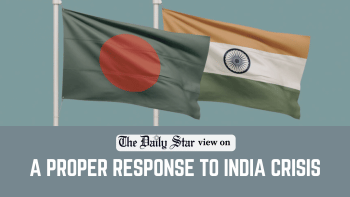
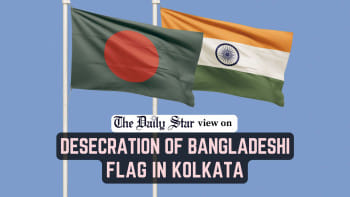
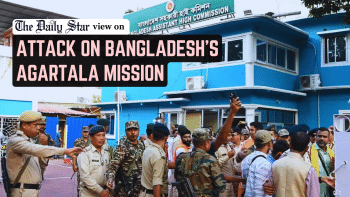

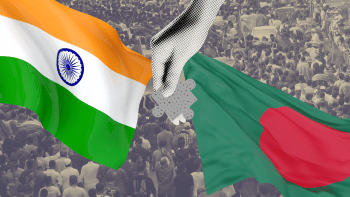



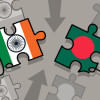





Comments